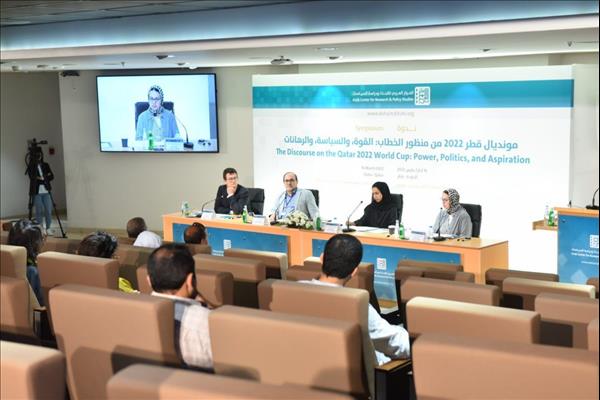(MENAFN- The Peninsula) The Peninsula
Doha: The Gulf and Arabian Peninsula Studies Unit of the Arab Centre for Research and Policy Studies (ACRPS) yesterday held a symposium,“The Discourse on the Qatar 2022 World Cup: Power, Politics, and Aspiration”. The meeting addressed the FIFA World Cup Qatar 2022, the discussions it encouraged and the intense debates. Leading experts on the topic presented four panels and nine papers.
The symposium was inaugurated by researcher Abdulrahman Albaker, who addressed the Arab Center's attempt to keep up with the cultural debates invoked by Qatar 2022. Albaker explained that the main framework through which the event was dealt with is based on two conceptualisations,“soft power” and“national branding”. The symposium sought to delve into the issues re-introduced by the event: identity, North-South relations, Western centrism and how to confront it, the post-colonial world, multiculturalism, cultural relativism, globalisation,“universal culture”, and neo-orientalism.
The first panel,“2022 Qatar World Cup and Questions of Cultural Relativism”, was moderated by Reem Al-Ansari, Law Professor at Qatar University, and included two presentations. Hans Hognestad, Professor of Sociology of Sport at the University of South-Eastern Norway, opened the panel with“Qatar 2022: Fan Ontologies, Soft Power, and Questions of Cultural Relativism”, a paper co-authored with Richard Giulianotti, Professor of Sociology at Loughborough University. The presenters explored some of the main political and cultural discourses and debates surrounding Qatar's hosting of the World Cup finals, identifying the key issue related to“fake” and wider transnational fandom at the event and the potential emergence of new“fan ontologies”.
Joel Rookwood, Lecturer in Sport Management at University College Dublin, presented his paper“Building Soft Power and Avoiding Soft Disempowerment Through Football Mega-Events: Addressing Multiculturalism and Global Culture in Qatar.” The paper demonstrated how Qatar's hosting of the World Cup was framed as an attempt to influence international audiences and build soft power. He further conceptualised criticisms towards host nations as a form of soft disempowerment and examined how lessons learned from hosting previous competitions affected the staging of the 2022 World Cup.
The second panel, titled“2022 Qatar World Cup in the Critical Discourse”, moderated by ACRPS Researcher Aicha Elbasri, began with Marc Owen Jones, Associate Professor of Middle East Studies at HBKU, who delivered a paper“Reductionism and Orientalism: Ten Years of Media Representation of Qatar's World Cup in the British Press”. Jones analysed newspaper headlines mentioning Qatar and Russia since 2010 to create a typology of themes and agenda-setting related to Qatar 2022.
Mohammed El Fatih Hamdi, Assistant Professor at QU and Hichem Akoubache, Professor at the Department of Mass Communication at QU, referred in their paper“The Campaign against the Qatar World Cup: An Analysis of the French Media Discourse” to the campaign launched by some French media outlets against Qatar due to its hosting of the 2022 World Cup, and how this campaign focused on specific issues.




















Comments
No comment